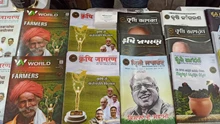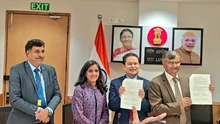
The American Rescue Plan Act-funded Compost and Food Waste Reduction (CFWR) cooperative agreements are part of USDA's broader support for urban agriculture through its Office of Urban Agriculture and Innovative Production (OUAIP). Between 2023 and 2025, the projects will be implemented.
"These Compost and Food Waste Reduction projects play critical roles in the development of resilient, local food systems, including strong food recovery networks and food waste reduction solutions that benefit farmers and communities," said Terry Cosby, Chief of the USDA's Natural Resources Conservation Service (NRCS), which houses OUAIP. "With uneaten food accounting for an estimated 4% of US greenhouse gas emissions, local strategies and tools like these are critical climate solutions."
The USDA prioritized projects that anticipate or demonstrate economic benefits include plans to make compost easily accessible to farmers, including community gardeners, incorporate other food waste strategies, such as food recovery efforts, and collaborate with multiple partners.
Projects in 27 states and 1 territory are among the recipients. Some recipients' highlights include:
1. Geneva Compost and Food Waste Diversion, Town of Geneva, Geneva, N.Y.
The project will work with a number of partners to improve Geneva's environmental justice profile by diverting food waste and other biodegradables from the waste stream, producing nutrient-rich compost, improving soil quality, reducing reliance on fertilisers, and participating in food recovery efforts that take "extra" food and distribute it to community members in need.
2. Composting and Food Waste Reduction Pilot Project, Tucson Unified School District, Tucson, Ariz
This pilot project will construct the infrastructure required to provide compost to school and community gardens, improve soil quality, reduce food waste, and demonstrate the economic benefits of incorporating food reclamation education as an integral part of a school garden and nutrition programmes for students, their families, and the Tucson and Pima County, Arizona communities.
3. Tlingit and Haida Compost Pilot Project, Central Council Tlingit and Haida Indian Tribes of Alaska, Juneau, Alaska
This pilot composting programme will work in tandem with the Tribe's newly built Taay Ht Greenhouse in Juneau, which already produces fresh produce for tribal citizens. Tlingit & Haida's Climate Change Adaptation Plan and Climate Change Action Plan, which prioritize food security and community greenhouse projects, support the integrated composting and greenhouse programme design. Tlingit and Haida were the first to incorporate agricultural science into a greenhouse operation, using the best growing practices to maximize sustainable food production. The Taay Ht Greenhouse recently completed its first harvest, serving community elders a curry soup with bok choi, kale, and cilantro.
4. Miami-Dade County 2022 CFWR Pilot Project, Miami-Dade County, Miami, Fla
This project will carry out a two-year pilot project to kickstart a circular economy for food waste by accelerating and scaling the services of three small locally owned composting companies. Over the course of one year, the project will increase existing service capacity by 50%, obtain a renewable 18-month pilot project permit, and develop a commercially viable compost product that can be used by Miami-Dade County's Parks, Recreation, and Open Spaces Department to create a circular economy for food waste and compost that will reduce landfill food waste and replace chemical fertilizer.









